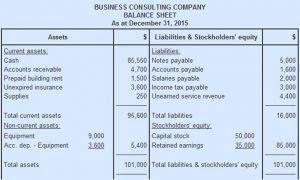
Ecommerce businesses should accurately categorize expenses and regularly reconcile them against budgetary targets. This way, businesses can identify cost-saving opportunities, negotiate better ecommerce bookkeeping vendor terms, and allocate resources strategically to drive profitability. Establishing clear accounting procedures and workflows ensures consistency and accuracy in financial record-keeping.
Bookkeeping is key for small business growth
- Each revenue stream should have its account within the chart of accounts to track sales performance and revenue trends separately.
- The vast majority of deposits are the result of direct sales made by the business.
- This may influence which products we write about and where and how the product appears on a page.
- Effective inventory management is crucial for ensuring that products are available for sale without overstocking, which can tie up capital unnecessarily.
- That said, like most traditional bookkeepers, an eCommerce bookkeeper must also categorize different types of income and expenses, track returned purchases, and review balance sheets.
If you use multiple payment providers for shoppers in different locations, it’s important to reconcile all the fees together to create a total amount. This method takes the average cost of all inventory items sold, no matter when they were acquired, and applies this average cost to all inventory. Track your inventory on a monthly or quarterly basis to make sure it’s kept up to date. This is especially important if you process returns or store inventory in multiple locations. It’s crucial you collect sales tax if your business operates or has a presence in a US state where sales tax is mandatory, which is most states. The presence of your business in a state is known as nexus, and you must collect sales tax for every nexus you have.
How to track inventory in ecommerce bookkeeping

With these answers, the ecommerce owner can figure out the best way to proceed with their business. Accounting rules and tax regulations differ by country and state, so staying up to date is crucial to your success. Even if accounting isn’t your strong point, there are a few simple guidelines to follow for managing a smooth ecommerce operation.
Ecommerce Accounting & Bookkeeping Guide To Best Practices
- It also shows you exactly what your business is worth if you liquidate it at that moment.
- If you run an online store, you know how important it is to keep track of your finances.
- Ecommerce bookkeeping comes with challenges, distinct from other business models such as services or software sales.
- Let’s take a closer look at ecommerce bookkeeping, the challenges setting it apart from traditional methods, and shed light on effective bookkeeping strategies for the digital marketplace.
- A big part of that is assessing financial statements, such as the balance sheet, profit and loss statement, and cash flow statement.
Bookkeeping has to be done on a regular basis to make sure that accounting is up to date and accurate. As such, there’s a big difference between bookkeeping and accounting. Foreign transaction fees present an entirely different kind of issue for eCommerce. Traditional businesses generally see foreign transaction fees that are charged directly to their bank accounts, with the fees designated by the payment processor.

Financial reporting provides insights into revenue, expenses, assets, liabilities, and equity, enabling stakeholders to assess the business’s financial health and make informed decisions. Ecommerce businesses have various tax obligations, including https://www.bookstime.com/articles/bookkeeper360 sales and income tax and possibly international taxes (if selling globally). Businesses must accurately calculate and collect sales tax from customers, file tax returns on time, and comply with tax regulations to avoid penalties and fines.
Resources for Your Growing Business
If you want to make it as simple as possible to manage your business account simply and easily, Kashoo might be right for you. It may be a bit basic for businesses that want more robust features, but if simplicity in the basics is what you’re looking for, this is a great solution. If you want to create highly customized invoicing, it might not be ideal for your needs. However, if you want an easy-to-use but powerful accounting tool to help you scale up, this might be the best software for you. Overall, investing in training and education for accounting staff and employees is a good practice. It enhances their skills and knowledge in bookkeeping practices and software usage.

Accounting software
- Ecommerce shines as a unique player in the business grounds, marked by its distinct characteristics and hurdles.
- Then, if you need to cover some aspects more thoroughly, you can choose software to complement your accounting solution.
- Now that you know the bookkeeping and accounting basics for your ecommerce store, you can feel confident knowing exactly where to begin.
- Because e-commerce retail tends to involve less physical space and equipment, your greatest assets are likely to be your cash and inventory.
The specific sales tax requirements vary by jurisdiction, including state, local, and international levels. To ensure compliance with sales tax laws, ecommerce businesses must follow several steps. An ecommerce business’s chart of accounts should include standard categories such as assets, liabilities, equity, revenue, and expenses. These categories provide a framework for recording and classifying financial transactions accurately. Some ecommerce platforms offer built-in features for handling sales tax.
Kashoo comes at a reasonable price and is even more affordable when paid annually. Multiple businesses can be added to your account as well, making it simple to keep track of all of your enterprises at once. It’s easy to set up and has great time-saving features like recurring invoices and auto connection to bank and credit card accounts for simple reconciliation. If you don’t have products to sell but need robust software with a great app to help you manage your accounting tasks on the go, FreeAgent might be right for you. It has a very easy-to-use mobile app that makes it convenient for you to bill, handle invoicing, track time, etc, on the go.
Over this quarter, you sold 5,000 units of inventory, meaning there was a total of 1,000 unsold. Since your March batch was the last “in,” you can assume the 1,000 unsold units this quarter are from the March batch, as everything in the earlier batches was sold first. To get the total cost of your inventory, simply add up the costs of all the items sold in order. If you initially operated out of a warehouse, then sold that space and moved into a smaller one, profit from the sale would be considered non-operating income.
Best Ecommerce Accounting Software For Easy Bookkeeping
Having up-to-date books matters because it allows you to know how your business is performing at any given time. The biggest reason that eCommerce businesses fail is because of a lack of clarity and oversight into how cash is spent. Generally speaking, you should understand and track your gross margins, plan and strategize to optimize your margins and focus on minimizing expenses to maximize margins.


Lascia un commento